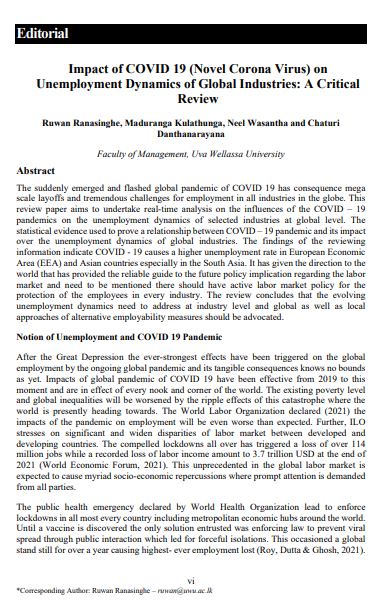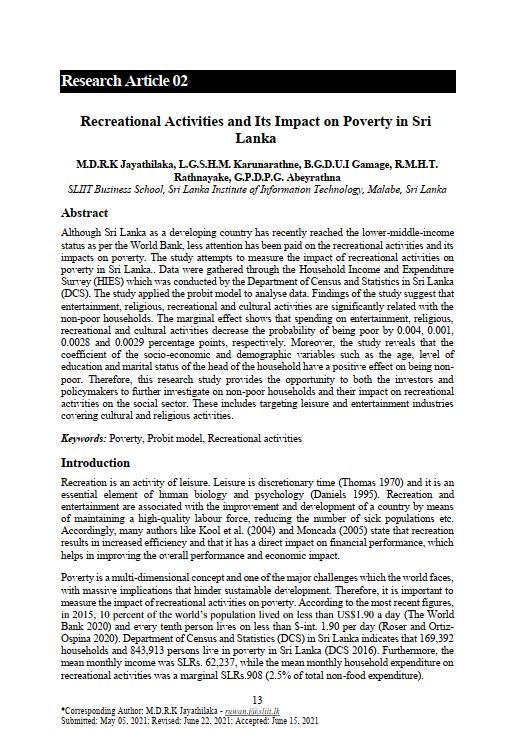Volume 04, Issue 02
TABLE OF CONTENTS
Editorial : Impact of COVID 19 (Novel Corona Virus) on Unemployment Dynamics of Global Industries: A Critical Review
Ruwan Ranasinghe, Maduranga Kulathunga, Neel Wasantha and Chaturi Danthanarayana
Faculty of Management, Uva Wellassa University
INFORMATION
Journal Title: Journal of Management and Tourism Research
Volume : 4 Issue : 02
Page : VI- XIII
ABSTRACT
The suddenly emerged and flashed global pandemic of COVID 19 has consequence mega scale layoffs and tremendous challenges for employment in all industries in the globe. This review paper aims to undertake real-time analysis on the influences of the COVID – 19 pandemics on the unemployment dynamics of selected industries at global level. The statistical evidence used to prove a relationship between COVID – 19 pandemic and its impact over the unemployment dynamics of global industries. The findings of the reviewing information indicate COVID – 19 causes a higher unemployment rate in European Economic Area (EEA) and Asian countries especially in the South Asia. It has given the direction to the world that has provided the reliable guide to the future policy implication regarding the labor market and need to be mentioned there should have active labor market policy for the protection of the employees in every industry. The review concludes that the evolving unemployment dynamics need to address at industry level and global as well as local approaches of alternative employability measures should be advocated.
01. Why do Indians Select Sri Lanka for Vacation? Motives and Consumption Values
D.M.C. Dassanayake
Department of Tourism and Hospitality Management, Rajarata University of Sri Lanka
INFORMATION
Journal Title: Journal of Management and Tourism Research
Volume : 4 Issue : 02
Page : 1- 12
Submitted: July 11, 2021; Revised: September 13, 2021; Accepted: August 18, 2021
Correspondence : cd66@students.waikato.ac.nz
ABSTRACT
In recent years, India has become the primary market of inbound tourism in Sri Lanka. However, there are few studies conducted on Indian visitors to Sri Lanka. This paper investigates the travel motives and selection factors that lead Indian tourists to choose Sri Lanka as their vacation travel destination with a value-based approach. Both numerical and textual data were collected using an online questionnaire with two open-ended questions. Descriptive statistics were calculated to determine the importance of main travel motivations and destination selection factors in the destination decision-making process. Leximancer maps were developed with textual data to identify the related themes in destination selection. Notably, both qualitative and quantitative data identified the functional, social, emotional, and conditional values as critical factors in destination selection. Further, the application of a value-based approach to investigate destination selection behaviour was found to be viable. The tourism practitioners in Sri Lanka should look into the promotional strategies with attributable features of Sri Lanka and social, emotional, and conditional factors.
Key Words : Consumption values, destination decision-making, Indian Travellers, travel motives, Sri Lanka
02. Recreational Activities and Its Impact on Poverty in Sri Lanka
M.D.R.K Jayathilaka, L.G.S.H.M. Karunarathne, B.G.D.U.I Gamage, R.M.H.T. Rathnayake, G.P.D.P.G. Abeyrathna
SLIIT Business School, Sri Lanka Institute of Information Technology, Malabe, Sri Lanka
INFORMATION
Journal Title: Journal of Management and Tourism Research
Volume : 4 Issue : 02
Page : 13 – 24
Submitted: May 22, 2021; Revised: June 22, 2021; Accepted: June 15, 2021
Correspondence : ruwan.j@sliit.lk
ABSTRACT
Although Sri Lanka as a developing country has recently reached the lower-middle-income status as per the World Bank, less attention has been paid on the recreational activities and its impacts on poverty. The study attempts to measure the impact of recreational activities on poverty in Sri Lanka.. Data were gathered through the Household Income and Expenditure Survey (HIES) which was conducted by the Department of Census and Statistics in Sri Lanka (DCS). The study applied the probit model to analyse data. Findings of the study suggest that entertainment, religious, recreational and cultural activities are significantly related with the non-poor households. The marginal effect shows that spending on entertainment, religious, recreational and cultural activities decrease the probability of being poor by 0.004, 0.001, 0.0028 and 0.0029 percentage points, respectively. Moreover, the study reveals that the coefficient of the socio-economic and demographic variables such as the age, level of education and marital status of the head of the household have a positive effect on being nonpoor. Therefore, this research study provides the opportunity to both the investors and policymakers to further investigate on non-poor households and their impact on recreational activities on the social sector. These includes targeting leisure and entertainment industries covering cultural and religious activities.
Key words Poverty, Probit model, Recreational activities
03. Transformational, Transactional Leadership and Employee Job Satisfaction: Evidence from Banking Industry in Sri Lanka
Mathushan. P
Faculty of Graduate Studies, University of Sri Jayewardenepura
INFORMATION
Journal Title: Journal of Management and Tourism Research
Volume : 4 Issue : 03
Page : 25 – 37
Submitted: May 21, 2020; Revised: July 06, 2021; Accepted: June 27, 2021
Correspondence : mathush92@gmail.com
ABSTRACT
In the contemporary business world, effective leadership is one of the salient factors in achieving organisational purpose and goals. Moreover, the link between leadership style and individual job satisfaction is one of the pivotal strategic aspects in any business organisation, and it has been one of the popular areas of study among psychology, management and organisational behaviour scholars. The present study investigates the impact of transformational versus transactional leadership styles on employee job satisfaction. The data were marshalled with a self-reported questionnaire from the employees working in banks in Sri Lanka. The data were analysed with SPSS. The results seem to indicate positive trends of all variables. Consistent with previous findings, the results show that transformational leadership significantly impacts job satisfaction than transactional leadership. The results support managers’ adoption of transformational leadership behaviours as a salient strategy for establishing robust working conditions that foster improved outcomes. Notably, the present study contributes to the frontiers of existing literature and offers valuable practical implications.
Key words Transformational Leadership, Transactional Leadership, Job Satisfaction
04. The Impact of COVID-19 Pandemic on Tourism Industry of Asian Countries: A Review
Tasnim Uddin Chowdhury
Department of Business Administration, Premier University, Chattogram, Bangladesh
INFORMATION
Journal Title: Journal of Management and Tourism Research
Volume : 4 Issue : 03
Page : 40 – 55
Submitted: May 21, 2020; Revised: July 06, 2021; Accepted: June 27, 2021
Correspondence : tasnim099@gmail.com
ABSTRACT
The COVID-19 pandemic has brought international travel and movement to an abrupt halt and resulted in a significant disruption on the tourism industry of the world. Many researchers have shared their work showing the impact of the COVID-19 pandemic on the tourism industry. This article is an attempt to provide a comprehensive review of the works that has been done in the context of Asian countries. It reveals that all the selected countries have already experienced a dramatic contraction in terms of their national income and hike in the rate of unemployment due to the disastrous impact of the COVID-19 pandemic on the tourism industry. As such, policy makers should play a vital role to find out appropriate resilience strategies to overcome the adversity and make the tourism industry more attractive, comfortable and safer for the travelers in a post pandemic world.
Key words COVID-19, Tourism Industry, Asian Countries, Resilience Strategies





